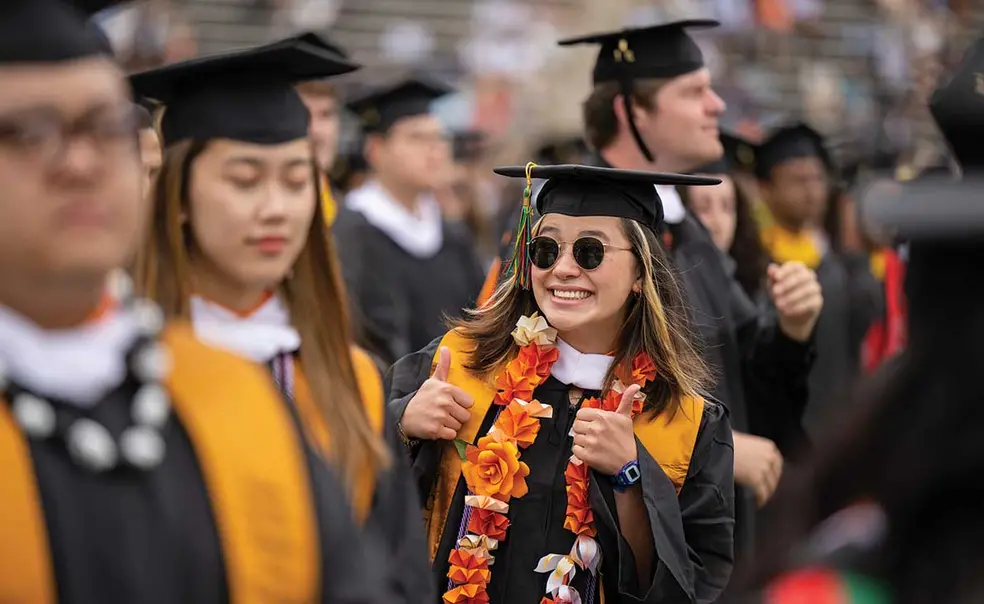Class of 2022 Commencement Features Levity — and Anthony Fauci
The celebrations acknowledged what students had endured over the last two and a half years
In a speech on Class Day, Owen Matthews ’22 recalled her first days on campus, when she imagined she would be debating complex philosophical concepts with her new collegiate peers. Instead, she said, they tackled a more pressing question: “Who would win in a fight, one giant Eisgruber or 100 tiny Jill Dolans?”
Matthews ultimately sided with the latter. At Commencement, the day after Matthews’ speech, the dean of the college introduced herself as “one of the 100 tiny Jill Dolans” — and noted that the president had been gracious in defeat.
Commencement 2022 marked a return to much of the levity that had been missing last year when the Class of 2021, masked and seated in chairs spaced 6 feet from one another, gathered at Princeton Stadium. This May, seniors joined the P-rade, danced at Prom, belted out favorite tunes at a Blair Hall Step Sing, and laughed together on Class Day. Master’s and Ph.D. graduates received their hoods in front of family and friends on Cannon Green, where Cole Crittenden *05, the acting dean of the graduate school, welcomed the “star-21s and star-22s” to the constellation of graduate alums.
Still, the celebrations acknowledged what students had endured over the last two and a half years. Senior-class president Santi Guiran ’22’s remarks on Class Day exemplified a mix of the jovial and the somber. He cracked wise about Zoom etiquette but also spoke movingly about losing two grandparents to COVID-19 and considering taking time off from Princeton in the wake of those losses. “At my lowest,” he said, “I found my greatest strength in the same community that embraced me since I was a frosh.”
One of the most recognizable figures during the pandemic, public-health adviser Dr. Anthony Fauci, delivered the Class Day keynote address. He spoke about how the class had navigated the profound disruptions caused by COVID and shared some career advice, but the bulk of his speech dealt with repairing the disparities and divisions that plague America, in its health-care system and its public discourse.
“Seek and listen to opinions that differ from your own,” Fauci urged the class. “But apply your abilities to critically analyze and examine, which you have honed here at Princeton, to discern and challenge weak assertions built on untruths. As future leaders in our society, we are truly counting on you for that.”
At Baccalaureate in the University Chapel, Teach For America founder Wendy Kopp ’89, now the CEO of the international nonprofit Teach For All, also spoke about leadership, recalling a realization she made in the fall of her senior year, as the parade of recruiters began to arrive on Princeton’s campus: “Why weren’t we being recruited to teach as aggressively as we were being recruited to work in banks?” That question led her to envision a national teacher corps that would provide meaningful career paths for recent grads and address a need for teachers in underserved schools.
Kopp encouraged the graduates to follow paths that have similar meaning to them. “For your generation that is more aware of and passionate about tackling injustice than any before, my hope is that you will recognize that your time is your biggest asset, and that driven by your values and the purpose of shaping a better future, you will be intentional and conscious about where you put your energy,” she said.
The University’s 275th Commencement was again held in Princeton Stadium, away from the familiar lawn in front of Nassau Hall, though the bell rang over the public-address system to announce the start of the graduates’ procession. Degrees were conferred on 1,234 undergraduates from ’22 and two from previous classes (893 A.B. recipients and 343 B.S.E. recipients); 655 received graduate degrees, including 447 Ph.D.s. Five honorary doctorates were presented as well, recognizing individuals for distinguished contributions in civil rights, education, law, science, and business (see page 14).
President Eisgruber ’83 had the final word at Commencement and used part of his address to advocate for policies and legislation to help students who have left college, improve graduation rates, and support low-income students nationwide.
Eisgruber also hailed this year’s Princeton graduates for their persistence. “You earned your degrees in many ways and for many reasons, but not least because you persisted brilliantly throughout your time on this campus and away from it,” he said. “Getting to and crossing the finish line is hard, which is why we celebrate college degrees so enthusiastically.”










No responses yet